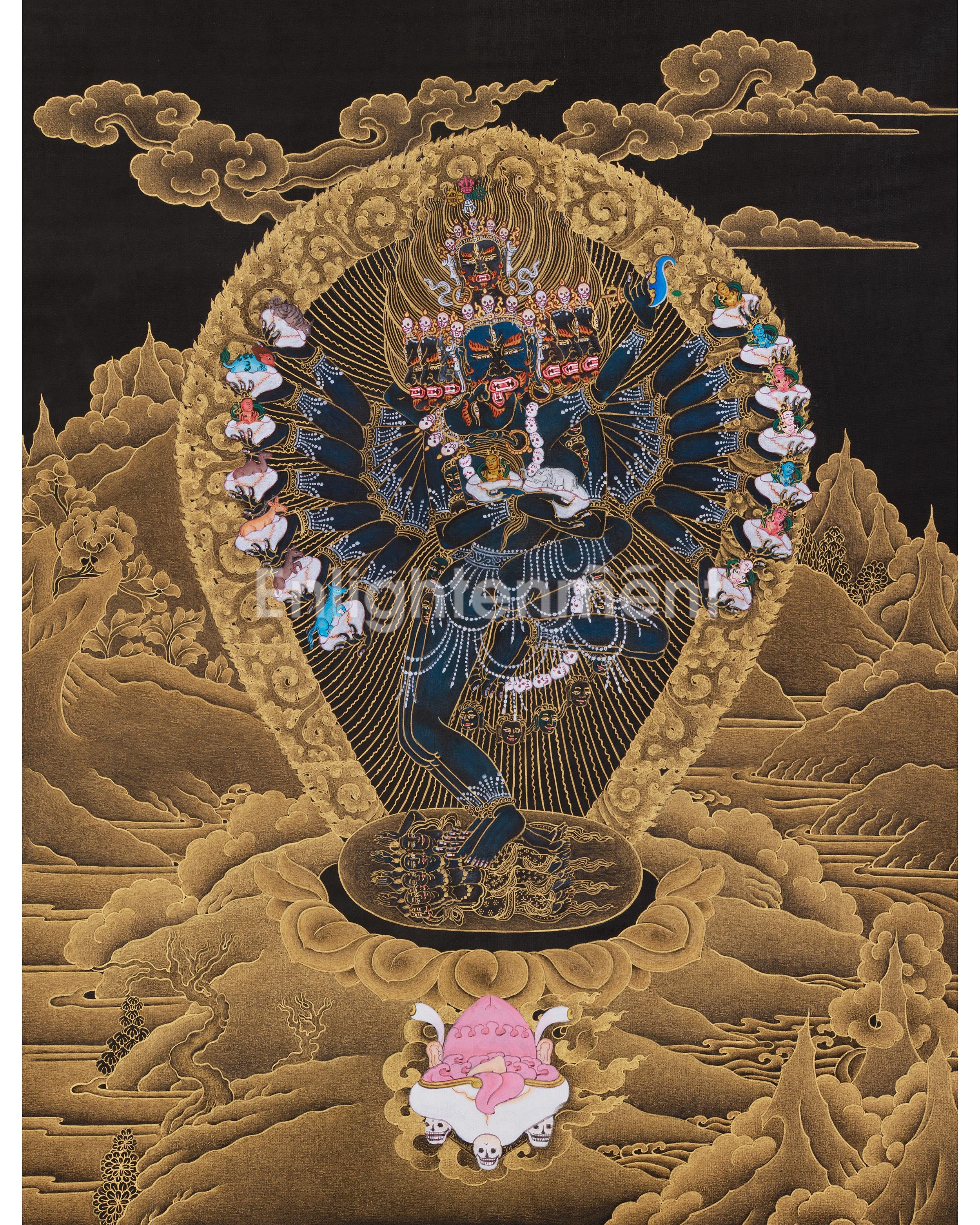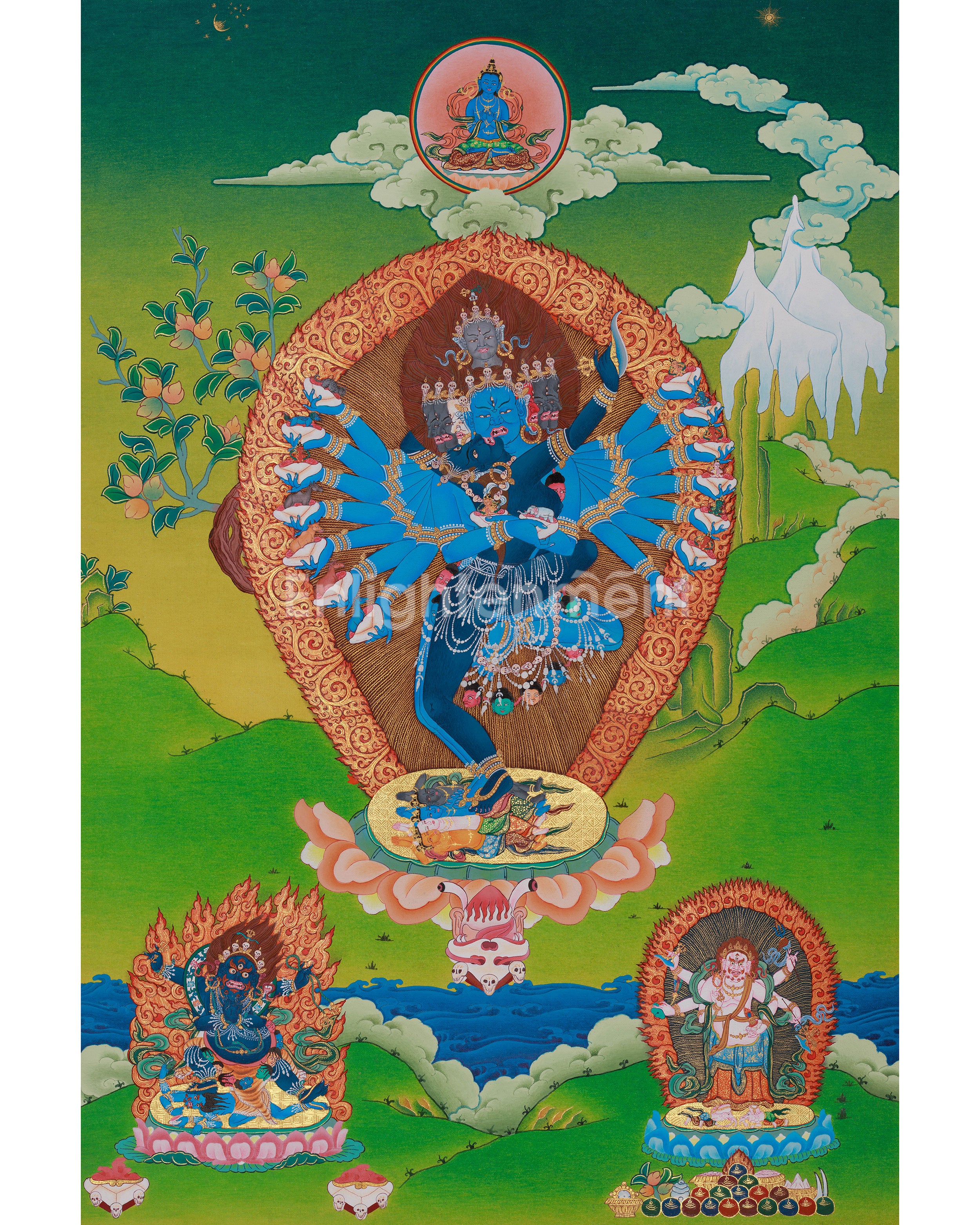Yidam
4 products
Showing 1 - 4 of 4 products
Yidam Thangka Collection – Meditational Deities for Vajrayana Practice
In Vajrayana Buddhism, a Yidam is a personal meditational deity—an enlightened being embodying specific enlightened qualities that practitioners seek to awaken within themselves. Through visualization, mantra recitation, and deep meditative absorption, one connects with the Yidam not as something external, but as the mirror of one's own awakened mind.
This sacred connection requires more than mere intellectual understanding. A precise, iconographically accurate Thangka becomes an essential support in Yidam practice—acting as a visual gateway into the deity’s mandala, helping the practitioner cultivate clarity, devotion, and unwavering focus. It acts as a sacred support for meditation, serving both as a focus for visualization and a reminder of the enlightened qualities practitioners seek to realize.
Our Featured Yidam Thangka in This Collection:
Hevajra Thangka
A principal tantric deity of the Hevajra Tantra, Hevajra is depicted with eight faces, sixteen arms, and four legs, embracing his consort Nairatmya. He represents non-dual awareness and the power to destroy inner delusion. Ideal for advanced Vajrayana practitioners, Hevajra’s thangka is often painted in rich blues, deep reds, and gilded detailing to highlight the transformative energy of this wrathful deity.
Yamantaka (Vajrabhairava) Thangka
Known as the Wrathful Form of Manjushri, Yamantaka subdues the Lord of Death (Yama) and transforms ignorance into wisdom. He has multiple heads, arms, and legs, often trampling demons beneath his feet. Our Yamantaka thangkas come in powerful black or red backgrounds, with 24K gold detailing, traditionally painted in Newar or Karma Gadri style.
Chakrasamvara Thangka
One of the most widely practiced Yidams in the Vajrayana tradition, Chakrasamvara is embraced in Yabyum with his consort Vajravarahi, symbolizing the union of wisdom and method. This deity is central to many advanced Highest Yoga Tantra systems. Our thangkas depict him in his 62-deity mandala or in central form, with rich natural pigments, sometimes enhanced with fine gold lining.
Vajrakilaya (Dorje Phurba) Thangka
The deity of obstacle removal, Vajrakilaya manifests the sharp, penetrating wisdom of the enlightened mind. He wields a phurba (ritual dagger) and is surrounded by flames of pristine awareness. His thangka is often rendered in a fierce, dynamic posture, in deep blues and reds, perfect for practitioners facing challenges or seeking spiritual protection.
Kalachakra Thangka
Symbolizing the wheel of time, Kalachakra is a multi-armed, multi-headed Yidam representing the complete cosmos. His thangka is complex and deeply symbolic, ideal for practitioners engaged in Kalachakra initiation. We offer detailed depictions following traditional iconographic standards.
Guhyasamaja, Vajrayogini, Hayagriva, and others
Each Yidam included in this collection holds a significant place in various tantric lineages (Gelug, Nyingma, Sakya, Kagyu). Whether it is the secret teachings of Guhyasamaja, the transformative red Dakini Vajrayogini, or the horse-headed wrathful protector Hayagriva, each thangka here is created with precision, devotion, and adherence to lineage standards.
Why Practitioners Choose Our Yidam Thangkas:
🔹 Hand-painted with precision by lineage-trained artists
🔹 Iconographically accurate, suitable for traditional sadhana practice
🔹 Free Worldwide Shipping
🔹 Ideal for retreat practice, shrine setup, or spiritual gifts
🔹 Personalized commissioning available for rare or custom Yidam forms
Whether you're looking for a powerful support for deity yoga, a piece of sacred art to enhance your altar, or a meaningful gift for a dedicated practitioner, our Yidam Thangka collection offers authenticity, spiritual integrity, and aesthetic mastery.
Explore the depth of Vajrayana with a thangka that resonates with your practice.




